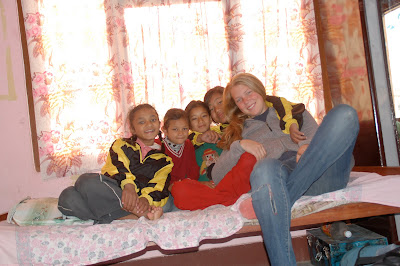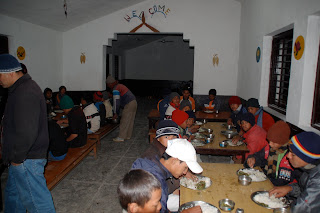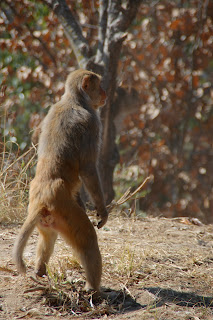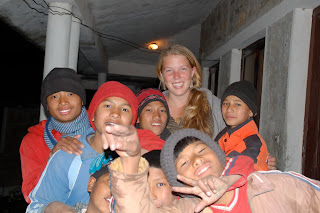I was really excited and a little nervous to go back to the Guarishankar orphanage where I did my first placement with Felicia. Excited because I missed the boys and the beautiful setting and delicious authentic Nepali meals. Nervous because although I had been in Nepal for almost four months when I left, I still hadn't gone anywhere without at least one companion who was fluent in English. And because I wasn't sure if my ambitious intention of painting 2 large murals on the walls of one room and painting the inside of the dining room would work out. I really had no idea what I was doing.
On the day I arrived and the next day, my nervousness prevailed. I succeeded in going to buy some paint, guessing how much I would need, but I was having a hard time explaining to Gita, the Auntie, or anyone else what I intended to do with the paint. Uncle Om was in Kathmandu on business for the first couple days, so I couldn't really talk to him. I also discovered that the walls of both the rooms I wanted to paint in were covered with this mysterious chalky white substance that came off a little by scratching or soap and water. I didn't know a lot about painting a wall with enamel but I did know you were supposed to have a clean, dry surface: not one covered in a strange powder. I had no idea how to go about removing it. Also the room I wanted to paint the two main murals in had been turned into a computer room since I left-a donation from a foreigner-and I didn't want to paint near them, especially since the walls were already covered by drawings the boys had made, including several from the classes Felica and I taught so many months ago. Of course by the time I figured all of this out, I had already bought enough paint for a couple large murals. And on top of all that, I didn't have a fellow volunteer to freak out to. I couldn't even take my mind of things by playing with the boys since they were all in school. I was not happy. I took comfort in reminding myself that I didn't take a gap year just to coast for a year, I took it to improve upon myself in ways that I can't while in school and to learn real-world lessons. And there they were, being learnt: nothing is as simple as you plan for it to be.
Luckily things started turning around the next day. Firstly, many of the boys had a day off from school since they were starting exams the following day and I spent the morning and early afternoon playing all sorts of games with them. They were just as excited and curious and funny as the first time. I re-learned the rules of carim, one of the most popular games in Nepal that's like pool but you play with flat plastic discs and try to flick them into one of the four holes. I remembered the rules okay but was just as terrible as when I learned in October. I also played ping pong on two dining room tables pushed together, and my favorite called "Bomb Blast" played with a small ball made from black rubber strips- the goal was to hit other players or catch a ball thrown at you to get each other out. The best part was that if the person who got you out was out, you were back in. So you could only effectively win by getting every single person playing out-the game went on for a long time.

Playing carim
Uncle also came back in the afternoon and approved my new plan to paint the front gate- a place where I wouldn't get in the way and that wasn't covered in white stuff, and proposed some projects to keep me busy after that was done. By the end of the first week I had cleaned the gate and painted a mural of Guarishankar mountain on it, which the orphanage is named after. The paint was strange- very fluid and glossy: difficult to mix and use at first but I eventually got the hang of it and was fairly pleased with the result.
The gate: before
The gate: after
Over the next two weeks one of the brothers(three men who cook, clean, garden and do repairs at the orphanage) named Orco and I, with help from the boys, would fix and paint the slightly crumbling pillars on either side of the gate: fix them with real cement and paint them with white cement. White cement is actually the same mysterious white substance covering most of the walls in the orphanage. It's just a cheap paint substitute and comes off with wire brush scraping followed by water, so painting enamel is possible on the walls after all. We took advantage of this and painted enamel on the bottom half of the dining room, the main room of the main building, and the hallway leading to the boys' rooms so they would look nice and be easier to clean. We painted another white cement coat on the tops of those rooms, and put another coat on all the pillars around the orphanage. We repainted many of the windows and doors in enamel and resurfaced and painted the tables in the dining room. We also re-painted the sign on the roof in enamel that said, in Nepali, "Nepal Children's Organization - Guarishankar Orphanage - Mati/Charikot, Dolokha - Est. 2053 (the Nepali year)."
The last project I did before leaving was to give the artistically-minded boys pencils and paint and brushes and help them design and paint their own pictures on the dining room walls, which was the most fun I think. I was drawing in the dining room with one of the most artistic boys, Pasang, who I hadn't had many conversations with before since he was usually pretty shy and he told me that the orphanage felt different when I was there. I didn't ask how it felt different but I'm pretty sure he meant it in a good way. It made me feel useful.

The roof: before
The boys trying to figure out how to use my camera while I paint on the roof
Orco brother painting on the roof
Completed roof and gate!
Pasang sketching welcome with namaste hands in the dining room
Painting in the dining room- Sitaram's design
The boys eating dinner with their new designs on the walls
Newly painted main building hallway
Between working I would play carim with the boys (I was actually pretty decent and sometimes even won by the end of the three weeks) or play with Uncle and Auntie's chori, a two year old that had the boys, the brothers, and everyone else wrapped around her little finger. She was quite shy at first, and since uncle's family was away for most of our previous stay I didn't get to know her then. By the end of these three weeks she would actually ask me to hold her sometimes and I obviously couldn't resist.
Om and Gita's daughter
Work was also alternated with plentiful cups of fresh milk tea, breakfast and dinners of delicious lentil soup, rice, vegetable curries straight from the garden, spicy pickled ginger or tomato, and the occasional fried egg. Tiffin (lunch) usually consisted of toasted sugared chiura (beaten rice flakes) with spicy snack mix and fried potato. I didn't expect to gain weight in Nepal before I went, but I'm not surprised now that I did. It was too delicious all the time, and they took how much I ate to mean how much I liked it, so I could never say no even if I had wanted to.
Even with all this I still had free time which I filled with copious amounts of reading-I brought six books from the exchange library at the volunteer house and read them all over the three weeks. It was actually nice to have a setting in which I could read so much-with the internet at my fingertips that never happens. It's sort of fun to be able to dive into a book and not resurface until it's finished. My favorite book was The End of Mr. Y By Scarlett Thomas. Truly genius. The reading seemed to make up for the fluent and plentiful English conversation I was so used to. The boys were really sweet and more than one asked me "Are you lonely?" or "Are you Boring?" I had to convince them that no, I wasn't lonely with such wonderful people all around and no, I wasn't bored, I found it rather peaceful and a welcome respite from the pollution and noise and craziness of Kathmandu.
The daily routine was broken up occasionally by a special event: finding and chasing a pack of monkeys through the forest with the boys, watching the lemons be crushed into juice with an ancient Nepali lemon-juicing tool, the first of Mag (5th Nepali month) festival in which we ate a sort of yam and home-made molasses sweets, the festival celebrating the birth of the God of education, which of course meant a day off from school, and two visits by an Italian family.
One of a HUGE pack of monkeys
Crushing lemons
The Italian family with their little brother
The Italian couple had adopted two children, a brother and sister, from Guarishankar back when it was first starting, and their little brother still lives at Guarishankar but can't be adopted due to the ban on foreign adoptions in Nepal. It's in the process of being lifted, with many restrictions, but that will probably take years and years. So this couple adopted the brother and sister when they were around ten, and and they're now around eighteen and came back to visit their homeland and their little brother for the first time since they were adopted. They were a really fun family, although they always made fun of my American accent. They spoke about as much English as Uncle, but since Nepali English and Italian English are such different dialects I would sometimes have to translate for them, which was kind of amusing.
When they visited I had to move into the smaller guest room which doubled as a puja room, although I really didn't mind since it often smelled of sweet insense. The regularity with which Auntie prayed everyday, supplemented by fasting, was quite inspiring and comforting in a strange way. Some people just move through the motions of a religion but when she would tell me 'I belive God' her sincerity and good heart were unmistakeable. The only time she wouldn't promptly heed the call of her small daughter was when she was performing puja. She once asked me if I believed in God and when I told her "Sometimes" she laughed quietly.
Gita performing Puja
Although the adopted children of the Italian family and their brother all have different unknown biological fathers, their mother is still alive and in a nearby town to orphanage - but she's not quite right in the mind anymore. Originally the family wasn't going to take the trouble of seeing her since she probably wouldn't even recognize the children and it might cause more troubling feelings than closure, but Uncle and Auntie convinced them it was really their duty as children to visit their mother. In the Hindu culture the obligations of children toward their parents is taken very seriously and in the end they came back to see her. It was a very highly charged, emotional meeting. She was cognizant for the first part and although she didn't recognize them at first she accepted Auntie's explanation of who the children were and that they were being well taken care of. The Italian parents thanked her for bringing the children into the world and she said she was happy that they're taken care of but wished they would visit her more, and Auntie and Uncle had a hard time explaining that they didn't have the resources to come from Italy very often. She saw their nice clothes and didn't understand why they couldn't visit. And then she started talking without making any sense and Uncle and Auntie gave her some food and money and sent her back home. Everyone was crying a little bit.
I set a day to leave, after all the projects were completed, but when the night before my departure date arrived I couldn't bear to leave and postponed it for a day. Om and Gita didn't seem to mind at all, they just said I should keep postponing my departure for a day forever. Over my whole stay the were so incredibly hospitable, always sharing anything they had and making sure I didn't need anything. And Gita would make sure I didn't do anything harmful to myself. They have a superstition that if you sit on something cold you're prone to get diarrhea. So one day I was sitting on the concrete with my legs hanging over the edge and Gita said "Don't sit there." and I said "Why, because it's cold?" and she said "Yes, you'll catch diarrhea" and Om said "You won't catch diarrhea, diarrhea will catch you!" Gita and I didn't stop laughing for a good five minutes. One day Gita made me a gooey, slimy soup from a thistle-like thorny weed. Rumor has it that if you drink one bowl every day you will have a very strong heart. It actually wasn't nearly as bad as it sounds and I sort of liked it, but it took much time and enthusiasm to convince her of that fact.

The day before I left the three brothers gave me a huge bag a goondrook-a sort of plant-spice that is the basis for the national curry of Nepal. They grew the leaves in the garden and then put them through the process to make the goondrook-first they dry it for a few days, then they soak it in water and beat it with sticks, then they compress the leaves in a pot for a few more days and dry them once more before using them in the soup-curry. They also gave me spoken recipes for many of the dishes they had cooked. It was the best gift-I was really touched.
Krishna and Gokul beating the goondrook
Even though the boys were mostly in school this time around, and so not quite as available for conversations and games, I still got to know each of them as individuals better than I had the first time, and I've never met a group of kids with a better sense of humor or who ask for less or who are more curious and open than these boys. It's really a magical gem of a place and I'm so so happy that I chanced upon it.
Keshab and Shamu, with Tenji's hand
Kal and Suraj
Uncle Om and Auntie Gita
The older boys singing a Nepali song at the farewell song/dance/speeches program
On the morning of my departure I was presented with two little wooden Buddha carvings. Although they're mostly Hindu at Guarishankar, a couple boys are Buddhist and they all take pride in Buddha being "The light of Asia." One was from Suraj and Kal, two boys I was close to, and one was from all the others. Uncle and Auntie presented it and said "Taryn, we love you. Don't forget us." Really, how could I? I started tearing. It was so difficult to leave. A couple boys went to walk with me to the bus, and the rest all waved goodbye at the gate. Birjung was among the ones walking with me and on the way he gave me a good-bye present of his own- one of the little glass boxes with two fuzzy chicks and a flower and a heart that I often saw on the dashboards of the over-decorated buses, with a note and a drawing from him on the wrapping paper. I opened it as the bus was driving away down the bumpy winding road to Kathmandu and with the image of everyone waving good-bye in my head, my heart felt so full it physically hurt. Nothing is as simple as you plan for it to be. Sometimes it's better.

















































